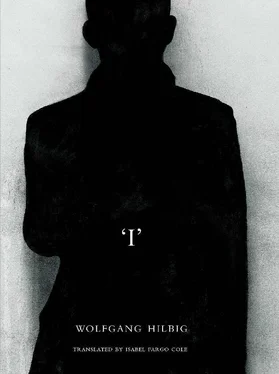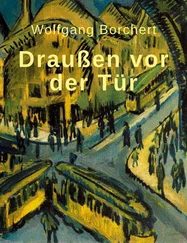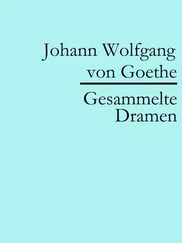But to his surprise there was activity outside the cafe, tables and chairs stood out on the light-flooded pavement, almost all of them still occupied, beneath colourful folding sunshades held to the ground by heavy cast-iron bases. The cafe had started its outdoor service! Every year it went from the eve of 1 May to 31 August. A wiry little waitress was hired for the four months; C. recognized her from afar, a colourless creature of indeterminate age — between thirty and forty, thought C., his intuition failing him here — who served promptly and precisely, still more remote than her indoors colleague who wandered lost in thought between the rows of tables. C. had never seen any of the jovial evening guests elicit even the semblance of a smile from the waitress’ pinched lips; her blonde hair was combed back tightly, adorned at the hairline by a tiny white cap which she didn’t seem to wear for decoration; on her, for some reason, it looked like part of a uniform illustrating her function. And she fulfilled this function stony faced, moving from table to table with an even tread and pedantically noting even the simplest order on a tear-off pad. . The manager’s UnCol, Feuerbach had said after only a minute the first time they’d sat at one of the outside tables. Let’s go inside, we’re being watched out here. — And C. had never managed to get service from her, because she had been severely insulted by his superior. On their second attempt to take advantage of the outdoor service, she came up to their table and punctiliously uttered the mandatory three words: Your order please. . And Feuerbach had requested: Two beers, three double brandies! — She gave a look of cool surprise and asked: Are you expecting another guest? — Feuerbach started to explain that the third brandy was for her, but shut his mouth again and screwed up his eyes. Then he said: Oh, by the way, miss, it works both ways. . why don’t you stick your cockade on that idiotic hat of yours! — With that they’d forfeited the chance of ever being served at the pavement tables again; they moved into the taproom. — She understood me! said Feuerbach, and explained to C. that in the Firm the word cockade was a very common code word for the human arsehole.
This evening — actually it was already night — the first lieutenant was not in the cafe; this knowledge was enough for C., and though his window seat in the taproom was still free, he headed for his flat. He had a bundle of papers in the inside pocket of his parka, the second part of the profiles for which he had taken notes during the Ecology and Perestroika workshop. The event didn’t really fall under Feuerbach’s purview, but it had been clear that a large portion of the Scene would show up there. . It’s about connections with the grassroots groups and so on, Feuerbach had said, not much fun for us, but work is work, and you don’t have to be too particular about it.
And, no doubt unconsciously, C. had done just that: twice he had dated the documents wrong. At the end of the first third, which he had delivered the day before, stood the date 27 April; the sheaf in his pocket, beginning with Person No. 30, was marked 28 April. . if it had gone on like that, the next day he would have written 29/04 under the rest. — But as a matter of principle the cafe tables weren’t set up outside until the eve of 1 May. . he had back-dated all his notes by one day. How was that possible? A little square daily tear-off calendar hung in his flat, and he never neglected to tear off the old sheet. At night he had typed up the list, because his handwritten notes were barely legible: you started sweating when you had to find five minutes at a public event to take notes unobserved, for instance, in much-frequented toilets which didn’t really lock. . the final straw would have been to get asked if he had diarrhoea — and he’d worked on it until five in the morning or later. . after all, it was twenty people he had to process, had to plausibly alter if necessary. . the second part of the list — Criminal profiles! he said — ought to have been delivered now, with the date 28 April beneath it. . but on that day the event in Rummelsburg had only just begun. — The only explanation was that two days ago he’d forgotten to tear off the calendar sheet from 27 April. .
The night before, he had slipped the first part of the list into Feuerbach’s hand under the cafe table; Feuerbach had tucked away the pages without looking at them and said: And tomorrow you’ll bring me the second day! — The whole thing was no big deal, of course, but it was a sign of nerves. .
All that had happened almost exactly a year ago; he no longer knew how he’d revised the false dates back then, or if they’d ever been corrected at all. . maybe he had gone on living with this faulty time ever since. — For perhaps the last year, he thought, we’ve gotten in the habit of arriving a little too late.)
Around noon he woke up in Frau Falbe’s double bed. Blazing sunlight flooded in through the big window on the left side of the room. . he had slept with his back to Frau Falbe’s half of the bed, lying on his side — as always with his knees drawn up and his fists in his lap — full of unrest and as though in a paroxysm, but the dreamless void had drawn him down all the deeper. As soon as he woke he felt the dull pain in the back of his head like a distant drilling, the after-effect, all too familiar, of an overdose of inferior alcohol. . of course he had sat in the pub for far too long, and in the end the drinking had become a sheer test of his endurance. Now he had that familiar taste of bile in his parched oral cavity, in his throat the uvula was sore and so tangibly swollen that it made him nauseous — he must have battered it with unbridled snores. Mucous had solidified rock-hard in his nostrils, and at rhythmic intervals a faint whistling noise escaped his lungs. . it wasn’t the bracing, cleansed awakening one marvelled at in James Bond movies. . the alcohol was famously better on the other side of the Iron Curtain.
And as another consequence of drinking inferior alcohol in an East Berlin dive, he had rung Frau Falbe’s doorbell again on his way back. Now he lay here in the bed of her long-vanished husband and had to extract his thoughts with an effort from amid the painful convolutions of his brain.
He hadn’t been able to get the date 27 April off his mind, and he didn’t know why. It wasn’t necessarily connected with the fact that he had once set it down beneath a list of profiles despite it being the wrong date. . no, it was connected with Feuerbach’s disappearance and reappearance. At the time he had mulled fruitlessly over the first lieutenant’s absence. . and yesterday in the pub his mind kept wandering and he’d recalled the start of the summer season, which the cafe on Frankfurter Allee marked by setting tables and chairs out on the pavement on the eve of 1 May. . for some reason he knew that in the year he was thinking of, this had happened for the last time: since then the cafe no longer had outdoor service.
And then he’d gone to the flat and got back to work on his dossiers (Criminal profiles! he vividly recalled the thought). Feuerbach hadn’t showed the next day either. . perhaps he could easily have found him. . on the holiday, with Frankfurter Allee bustling. . Had so-called counterdemonstrations on the national holiday been anticipated even that year?
Yesterday in the pub he’d glanced at the calendar behind the bar and happened to notice that it was 27 April. . he could count on Feuerbach being back again on 1 May, or even the evening before, or even now, sitting in the cafe as though nothing had happened. . except that the tables and chairs were no longer outside, one less bit of metropolitan flair in the city. . Feuerbach had said: Just like in Amsterdam! Twelve at night, and everything’s still full. — Now he’d be forced to agree, like it or not, if W. remarked again that in the past year bad vibes had moved into the city. . Indeed, he’d replied back then, quite reliable, your seventh sense! And hopefully you’ve also guessed that it’s because of our presence. .
Читать дальше












